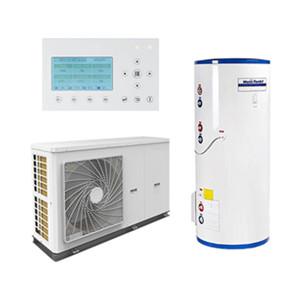Do Heat Pumps Work in Freezing Weather?
Yes, heat pumps work in
extremely cold temperatures. In the past, some heat pumps have worked better
than others in colder climates. However, thanks to technological advancements,
most heat pumps on the market today will keep you and your family warm in coldest winter days.
Why heat pumps don't
always work well in cold climates
Today, most heat pumps
work well in extremely cold climates. But that's not always the case.
Why? Because, instead of
heating a home or office building, a heat pump simply transfers heat from
outside into the interior. Because heat pumps do not generate new heat by
burning fuel, they are very efficient.
Some older types of heat
pumps will struggle to operate efficiently if it's cold outside. This is
because it requires more energy to transfer heat from a cold area (outdoors) to
a warmer place (home). This can be a problem because heat pumps need to
constantly pump heat into the house to keep it at a comfortable temperature.
Fortunately, many newer heat pumps have improved their ability to handle cold weather. Learn how heat
pump technology has evolved to perform well in even the coldest climates, and
how to choose the right heat pump for your home below.

Which type of heat pump
is best for cold climates?
1. Geothermal heat pump
Temperatures range from
45°F to 75°F just a few feet below ground level. Geothermal heat pumps take
heat from the ground and use it to heat a home or office building. Because the
temperature fluctuates little, the ground can be a reliable source of heat.
Whether you're using a
geothermal heat pump during sweltering summers or sub-zero winters, you can
rely on consistent temperatures underground and throughout your home.
Geothermal heat pumps work
well in extreme climates because the ground has enough heat to absorb in cooler
temperatures and enough low temperature to absorb in warmer temperatures.
2. Water source heat
pump
Some geothermal heat
pumps use bodies of water, such as ponds or lakes, to heat homes or office
buildings.
These heat pumps are a
great option if your property has a body of water. Compared to ground source
heat pumps, they cost less to install and provide a more stable temperature
than air source heat pumps.
However, it is important
to note that a large part of this cost efficiency is due to pre-existing bodies
of water for which source pumps can be installed. If your property does not
have a body of water, you may want to try a different heat pump for your home
or office building.
3. Air source heat pump
Air source heat pumps
are the most popular type of heat pump. They use outside air to heat a home or
office building.
Air source heat pumps
are generally considered inefficient at extreme temperatures. This is because
the colder the air outside, the harder it is for the heat pump to find heat to
transfer to the home.
However, in recent
years, the technology of air source heat pumps has advanced a lot, and the
devices now perform well in extreme climatic conditions. Several components of
the air source heat pump have been improved:
1. Coil Design
2. Electric Motor
3. Two-speed compressor
design
Technological
advancements that contribute to better performance in cold weather include:
1. The thermostatic
expansion valve can control the refrigerant flow of the indoor coil more
precisely
2. Variable speed blower
increases efficiency and offsets energy consumption from dirty air filters and
coils and blocked ducts
3. Copper pipes with
internal grooves to increase surface area
4. These are just some
of the innovations that make air source heat pumps an effective, money-saving
option, even in cold winters.
Ductless Small Split
Heat Pump
The ductless small split
heat pump is an air source heat pump. This system is ideal for homes that use
non-ducted heating, such as radiant panels and space heaters. They can also be
a good option for rooms or homes where new plumbing cannot be added or
installed.
The advantages of
ductless mini-split heat pumps include their small size and the ability to heat
and cool a single room, an energy-efficient process called zoning.
How to choose the right
heat pump for your home
Research can give you a
basic understanding of the heat pump options available. Even after you've
determined the type of heat pump you want, you may still need to research the
various features to determine the kind of home you want.
For example, if you are
looking into air source heat pumps, you may want to consider the following:
1. What is the Heating
Seasonal Performance Factor (HSPF) for this heat pump?
2. Does the heat pump
have on-demand defrost control? This minimizes defrost cycles and reduces the
supplemental heat needed to heat your home on the coldest winter nights.
3. What is the outdoor
sound insulation rating of the heat pump? The Department of Energy recommends a
rating of 7.6 Bel or lower.
A good thermal
insulation system:
How efficiently a heat
pump operates and how often you may need to use a backup heating system depends
on the type and efficiency of the heat pump, your climate zone, and the design
and efficiency of your home. All heating systems work most efficiently in more
energy efficient homes. When installing any type of new heating system,
consider what additional upgrades you can make to make your home more
efficient, such as upgrading your current insulation levels or upgrading
windows and doors.





